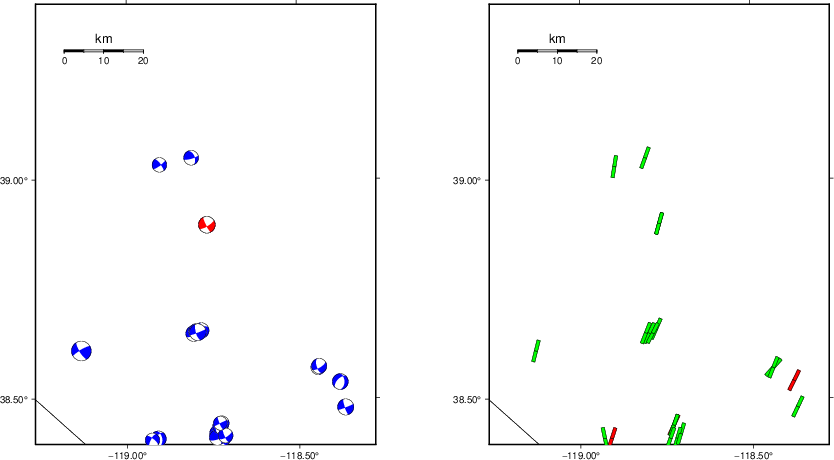Location
Location ANSS
The ANSS event ID is nn00349954 and the event page is at
https://earthquake.usgs.gov/earthquakes/eventpage/nn00349954/executive.
2011/10/01 07:07:01 38.897 -118.766 3.9 4.8 Nevada
Focal Mechanism
USGS/SLU Moment Tensor Solution
ENS 2011/10/01 07:07:01:0 38.90 -118.77 3.9 4.8 Nevada
Stations used:
BK.CMB BK.HUMO BK.MOD BK.SAO BK.WDC BK.YBH CI.GSC CI.ISA
CI.LDF CI.MWC CI.OSI CI.PASC LB.BMN LB.DAC NC.AFD NC.KBO
NC.KHMB NC.MDPB NN.BEK NN.PAH NN.PNT NN.RUB NN.TVH1 NN.TVH2
NN.TVH3 NN.VCN UU.BGU UU.LCMT UU.NLU UW.TREE
Filtering commands used:
hp c 0.02 n 3
lp c 0.06 n 3
Best Fitting Double Couple
Mo = 2.04e+22 dyne-cm
Mw = 4.14
Z = 10 km
Plane Strike Dip Rake
NP1 153 80 -165
NP2 60 75 -10
Principal Axes:
Axis Value Plunge Azimuth
T 2.04e+22 4 286
N 0.00e+00 72 184
P -2.04e+22 18 17
Moment Tensor: (dyne-cm)
Component Value
Mxx -1.55e+22
Mxy -1.05e+22
Mxz -5.26e+21
Myy 1.73e+22
Myz -2.97e+21
Mzz -1.77e+21
-----------
##------------- P ----
#####------------- -------
#######-----------------------
#########-------------------------
###########-------------------------
############------------------------##
############---------------------#####
T #############------------------#######
##############---------------##########
##################-----------#############
###################--------###############
####################----##################
########################################
################-----###################
##########-----------#################
##-------------------###############
---------------------#############
---------------------#########
---------------------#######
--------------------##
--------------
Global CMT Convention Moment Tensor:
R T P
-1.77e+21 -5.26e+21 2.97e+21
-5.26e+21 -1.55e+22 1.05e+22
2.97e+21 1.05e+22 1.73e+22
Details of the solution is found at
http://www.eas.slu.edu/eqc/eqc_mt/MECH.NA/20111001070701/index.html
|
Preferred Solution
The preferred solution from an analysis of the surface-wave spectral amplitude radiation pattern, waveform inversion or first motion observations is
STK = 60
DIP = 75
RAKE = -10
MW = 4.14
HS = 10.0
The NDK file is 20111001070701.ndk
The waveform inversion is preferred.
Moment Tensor Comparison
The following compares this source inversion to those provided by others. The purpose is to look for major differences and also to note slight differences that might be inherent to the processing procedure. For completeness the USGS/SLU solution is repeated from above.
| SLU |
UNR |
USGS/SLU Moment Tensor Solution
ENS 2011/10/01 07:07:01:0 38.90 -118.77 3.9 4.8 Nevada
Stations used:
BK.CMB BK.HUMO BK.MOD BK.SAO BK.WDC BK.YBH CI.GSC CI.ISA
CI.LDF CI.MWC CI.OSI CI.PASC LB.BMN LB.DAC NC.AFD NC.KBO
NC.KHMB NC.MDPB NN.BEK NN.PAH NN.PNT NN.RUB NN.TVH1 NN.TVH2
NN.TVH3 NN.VCN UU.BGU UU.LCMT UU.NLU UW.TREE
Filtering commands used:
hp c 0.02 n 3
lp c 0.06 n 3
Best Fitting Double Couple
Mo = 2.04e+22 dyne-cm
Mw = 4.14
Z = 10 km
Plane Strike Dip Rake
NP1 153 80 -165
NP2 60 75 -10
Principal Axes:
Axis Value Plunge Azimuth
T 2.04e+22 4 286
N 0.00e+00 72 184
P -2.04e+22 18 17
Moment Tensor: (dyne-cm)
Component Value
Mxx -1.55e+22
Mxy -1.05e+22
Mxz -5.26e+21
Myy 1.73e+22
Myz -2.97e+21
Mzz -1.77e+21
-----------
##------------- P ----
#####------------- -------
#######-----------------------
#########-------------------------
###########-------------------------
############------------------------##
############---------------------#####
T #############------------------#######
##############---------------##########
##################-----------#############
###################--------###############
####################----##################
########################################
################-----###################
##########-----------#################
##-------------------###############
---------------------#############
---------------------#########
---------------------#######
--------------------##
--------------
Global CMT Convention Moment Tensor:
R T P
-1.77e+21 -5.26e+21 2.97e+21
-5.26e+21 -1.55e+22 1.05e+22
2.97e+21 1.05e+22 1.73e+22
Details of the solution is found at
http://www.eas.slu.edu/eqc/eqc_mt/MECH.NA/20111001070701/index.html
|
REVIEWED BY NSL STAFF
Event ID:349692
Origin ID:838886
Algorithm: Ichinose (2003) Long Period, Regional-Distance Waves
Seismic Moment Tensor Solution
2011/10/01 (274) 07:07:02.00 38.8903 -118.7740 001
Depth = 8.0 (km)
Mw = 4.13
Mo = 1.95x10^22 (dyne x cm)
Percent Double Couple = 92 %
Percent CLVD = 8 %
no ISO calculated
Epsilon=-0.04
Percent Variance Reduction = 84.83 %
Total Fit = 8.93
Major Double Couple
strike dip rake
Nodal Plane 1: 59 71 -14
Nodal Plane 2: 154 76 -161
DEVIATORIC MOMENT TENSOR
Moment Tensor Elements: Spherical Coordinates
Mrr= -0.36 Mtt= -1.33 Mff= 1.69
Mrt= -0.60 Mrf= 0.32 Mtf= 0.98 EXP=22
Moment Tensor Elements: Cartesian Coordinates
-1.33 -0.98 -0.60
-0.98 1.69 -0.32
-0.60 -0.32 -0.36
Eigenvalues:
T-axis eigenvalue= 1.99
N-axis eigenvalue= -0.08
P-axis eigenvalue= -1.91
Eigenvalues and eigenvectors of the Major Double Couple:
T-axis ev= 1.99 trend=286 plunge=4
N-axis ev= 0.00 trend=188 plunge=66
P-axis ev=-1.99 trend=17 plunge=23
Maximum Azmuithal Gap=67 Distance to Nearest Station= 60.9 (km)
Number of Stations (D=Displacement/V=Velocity) Used=21 (defining only)
KVN.NN.D WAK.NN.D PNT.NN.D VCN.NN.D
PAH.NN.D RUB.NN.D BEK.NN.D TIN.CI.D
BMN.LB.D GRA.CI.D R11A.TA.D DAC.LB.D
TPNV.US.D HATC.BK.D FUR.CI.D BRK.BK.D
LRL.CI.D SHO.CI.D SHP.NN.D TUQ.CI.D
L04D.TA.D
------------ --
####------------ P ------
######------------ --------
########-------------------------
#########--------------------------
###########--------------------------
-############-------------------------###
##############----------------------#####
T ###############--------------------#######
###############------------------#########
#################---------------############
##################------------##############
###################---------################
####################-----###################
#####################-#####################
###########################################
##################--#####################
############--------####################
######---------------##################
---------------------###############
---------------------############
---------------------########
--------------------#####
-----------------
All Stations defining and nondefining:
Station.Net Def Distance Azi Bazi lo-f hi-f vmodel
(km) (deg) (deg) (Hz) (Hz)
KVN.NN (D) Y 60.9 73 253 0.020 0.080 KVN.NN.wus.glib
WAK.NN (D) Y 72.2 233 53 0.020 0.080 WAK.NN.wus.glib
PNT.NN (D) Y 74.7 288 107 0.020 0.080 PNT.NN.wus.glib
VCN.NN (D) Y 88.2 301 121 0.020 0.080 VCN.NN.wus.glib
PAH.NN (D) Y 105.4 330 150 0.020 0.080 PAH.NN.wus.glib
RUB.NN (D) Y 120.2 279 98 0.020 0.080 RUB.NN.wus.glib
BEK.NN (D) Y 174.4 309 128 0.020 0.080 BEK.NN.wus.glib
TIN.CI (D) Y 210.0 167 347 0.020 0.080 TIN.CI.wus.glib
BMN.LB (D) Y 216.6 37 218 0.020 0.080 BMN.LB.wus.glib
GRA.CI (D) Y 243.4 149 330 0.020 0.080 GRA.CI.wus.glib
R11A.TA (D) Y 282.8 101 283 0.020 0.080 R11A.TA.wus.glib
DAC.LB (D) Y 308.2 160 341 0.020 0.080 DAC.LB.wus.glib
TPNV.US (D) Y 308.9 133 315 0.020 0.080 TPNV.US.wus.glib
HATC.BK (D) Y 313.8 314 132 0.020 0.080 HATC.BK.wus.glib
FUR.CI (D) Y 317.2 147 329 0.020 0.080 FUR.CI.wus.glib
BRK.BK (D) Y 324.1 251 68 0.020 0.080 BRK.BK.wus.glib
LRL.CI (D) Y 391.1 165 346 0.020 0.080 LRL.CI.wus.glib
SHO.CI (D) Y 398.5 146 327 0.020 0.080 SHO.CI.wus.glib
SHP.NN (D) Y 414.1 129 311 0.020 0.080 SHP.NN.wus.glib
TUQ.CI (D) Y 459.1 146 327 0.020 0.080 TUQ.CI.wus.glib
L04D.TA (D) Y 474.7 322 140 0.020 0.080 L04D.TA.wus.glib
(V)-velocity (D)-Displacement
Author: www-data
Date: 2011/10/01 10:34:11
mtinv Version 2.1_DEVEL OCT2008
|



|
|
Magnitudes
Given the availability of digital waveforms for determination of the moment tensor, this section documents the added processing leading to mLg, if appropriate to the region, and ML by application of the respective IASPEI formulae. As a research study, the linear distance term of the IASPEI formula
for ML is adjusted to remove a linear distance trend in residuals to give a regionally defined ML. The defined ML uses horizontal component recordings, but the same procedure is applied to the vertical components since there may be some interest in vertical component ground motions. Residual plots versus distance may indicate interesting features of ground motion scaling in some distance ranges. A residual plot of the regionalized magnitude is given as a function of distance and azimuth, since data sets may transcend different wave propagation provinces.
ML Magnitude

Left: ML computed using the IASPEI formula for Horizontal components. Center: ML residuals computed using a modified IASPEI formula that accounts for path specific attenuation; the values used for the trimmed mean are indicated. The ML relation used for each figure is given at the bottom of each plot.
Right: Residuals from new relation as a function of distance and azimuth.

Left: ML computed using the IASPEI formula for Vertical components (research). Center: ML residuals computed using a modified IASPEI formula that accounts for path specific attenuation; the values used for the trimmed mean are indicated. The ML relation used for each figure is given at the bottom of each plot.
Right: Residuals from new relation as a function of distance and azimuth.
Context
The left panel of the next figure presents the focal mechanism for this earthquake (red) in the context of other nearby events (blue) in the SLU Moment Tensor Catalog. The right panel shows the inferred direction of maximum compressive stress and the type of faulting (green is strike-slip, red is normal, blue is thrust; oblique is shown by a combination of colors). Thus context plot is useful for assessing the appropriateness of the moment tensor of this event.
Waveform Inversion using wvfgrd96
The focal mechanism was determined using broadband seismic waveforms. The location of the event (star) and the
stations used for (red) the waveform inversion are shown in the next figure.
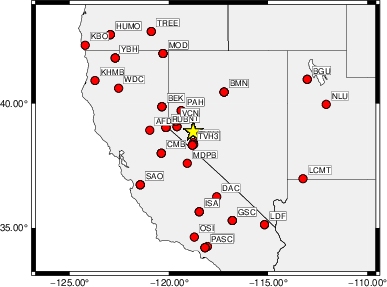
|
|
Location of broadband stations used for waveform inversion
|
The program wvfgrd96 was used with good traces observed at short distance to determine the focal mechanism, depth and seismic moment. This technique requires a high quality signal and well determined velocity model for the Green's functions. To the extent that these are the quality data, this type of mechanism should be preferred over the radiation pattern technique which requires the separate step of defining the pressure and tension quadrants and the correct strike.
The observed and predicted traces are filtered using the following gsac commands:
hp c 0.02 n 3
lp c 0.06 n 3
The results of this grid search are as follow:
DEPTH STK DIP RAKE MW FIT
WVFGRD96 0.5 60 90 -35 4.01 0.4442
WVFGRD96 1.0 245 85 35 4.03 0.4742
WVFGRD96 2.0 245 80 20 4.03 0.5157
WVFGRD96 3.0 60 80 -20 4.06 0.5479
WVFGRD96 4.0 60 75 -20 4.08 0.5767
WVFGRD96 5.0 60 75 -20 4.10 0.5972
WVFGRD96 6.0 60 75 -15 4.11 0.6115
WVFGRD96 7.0 60 75 -15 4.11 0.6200
WVFGRD96 8.0 60 75 -15 4.12 0.6238
WVFGRD96 9.0 60 75 -10 4.13 0.6259
WVFGRD96 10.0 60 75 -10 4.14 0.6274
WVFGRD96 11.0 60 75 -10 4.14 0.6229
WVFGRD96 12.0 60 75 -10 4.15 0.6166
WVFGRD96 13.0 60 75 -10 4.15 0.6086
WVFGRD96 14.0 60 75 -5 4.16 0.6013
WVFGRD96 15.0 60 75 -5 4.16 0.5936
WVFGRD96 16.0 60 75 -5 4.17 0.5860
WVFGRD96 17.0 60 75 5 4.18 0.5839
WVFGRD96 18.0 60 75 5 4.18 0.5812
WVFGRD96 19.0 60 75 5 4.19 0.5785
WVFGRD96 20.0 60 75 5 4.20 0.5750
WVFGRD96 21.0 60 75 5 4.21 0.5701
WVFGRD96 22.0 60 75 5 4.21 0.5649
WVFGRD96 23.0 60 75 5 4.22 0.5590
WVFGRD96 24.0 60 75 5 4.22 0.5528
WVFGRD96 25.0 60 75 10 4.23 0.5464
WVFGRD96 26.0 60 75 10 4.23 0.5400
WVFGRD96 27.0 60 75 10 4.24 0.5333
WVFGRD96 28.0 60 75 10 4.25 0.5266
WVFGRD96 29.0 60 75 10 4.25 0.5199
The best solution is
WVFGRD96 10.0 60 75 -10 4.14 0.6274
The mechanism corresponding to the best fit is
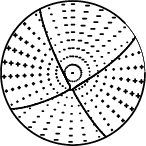
|
|
Figure 1. Waveform inversion focal mechanism
|
The best fit as a function of depth is given in the following figure:
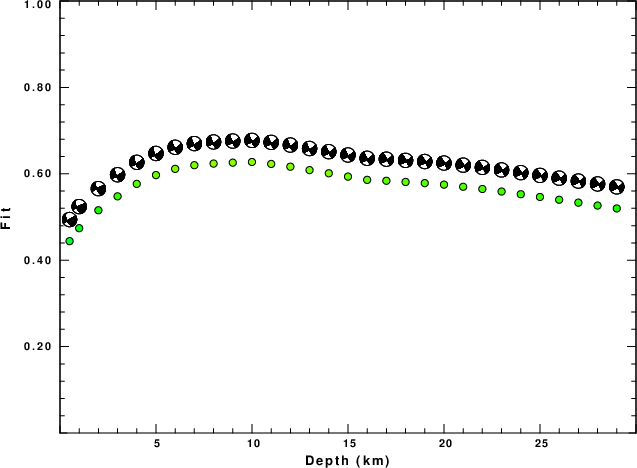
|
|
Figure 2. Depth sensitivity for waveform mechanism
|
The comparison of the observed and predicted waveforms is given in the next figure. The red traces are the observed and the blue are the predicted.
Each observed-predicted component is plotted to the same scale and peak amplitudes are indicated by the numbers to the left of each trace. A pair of numbers is given in black at the right of each predicted traces. The upper number it the time shift required for maximum correlation between the observed and predicted traces. This time shift is required because the synthetics are not computed at exactly the same distance as the observed, the velocity model used in the predictions may not be perfect and the epicentral parameters may be be off.
A positive time shift indicates that the prediction is too fast and should be delayed to match the observed trace (shift to the right in this figure). A negative value indicates that the prediction is too slow. The lower number gives the percentage of variance reduction to characterize the individual goodness of fit (100% indicates a perfect fit).
The bandpass filter used in the processing and for the display was
hp c 0.02 n 3
lp c 0.06 n 3
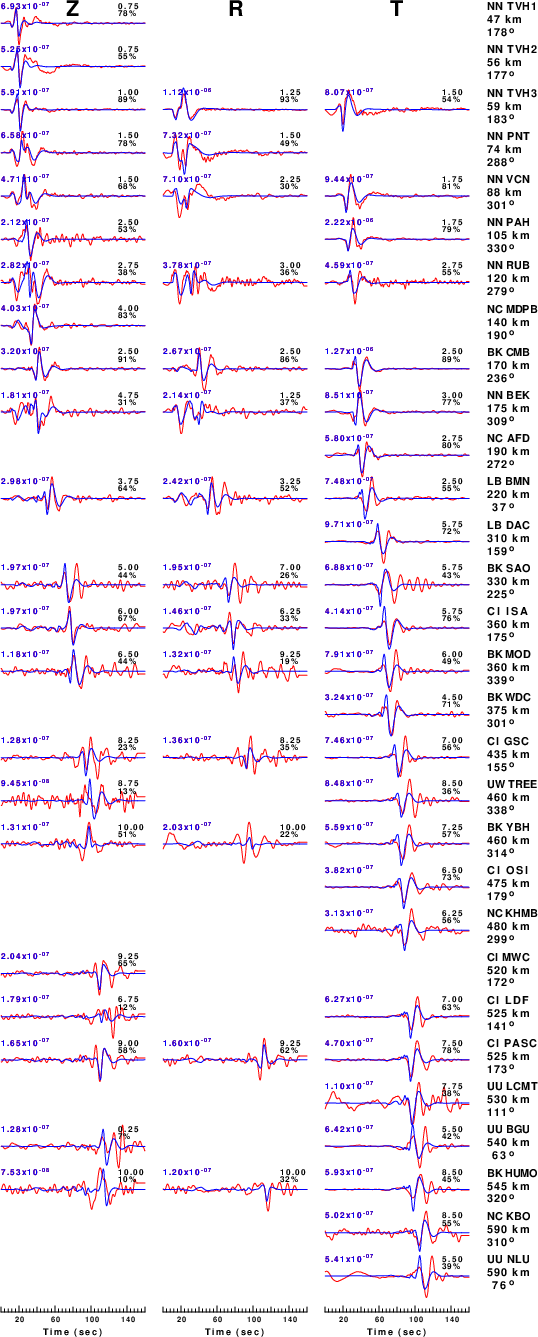
|
|
Figure 3. Waveform comparison for selected depth. Red: observed; Blue - predicted. The time shift with respect to the model prediction is indicated. The percent of fit is also indicated. The time scale is relative to the first trace sample.
|
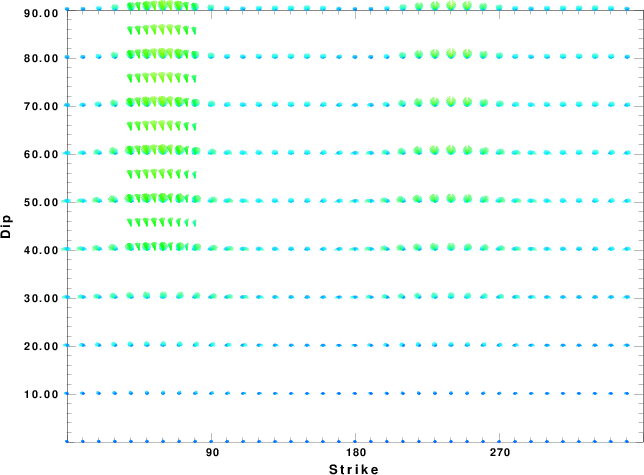
|
|
Focal mechanism sensitivity at the preferred depth. The red color indicates a very good fit to the waveforms.
Each solution is plotted as a vector at a given value of strike and dip with the angle of the vector representing the rake angle, measured, with respect to the upward vertical (N) in the figure.
|
A check on the assumed source location is possible by looking at the time shifts between the observed and predicted traces. The time shifts for waveform matching arise for several reasons:
- The origin time and epicentral distance are incorrect
- The velocity model used for the inversion is incorrect
- The velocity model used to define the P-arrival time is not the
same as the velocity model used for the waveform inversion
(assuming that the initial trace alignment is based on the
P arrival time)
Assuming only a mislocation, the time shifts are fit to a functional form:
Time_shift = A + B cos Azimuth + C Sin Azimuth
The time shifts for this inversion lead to the next figure:
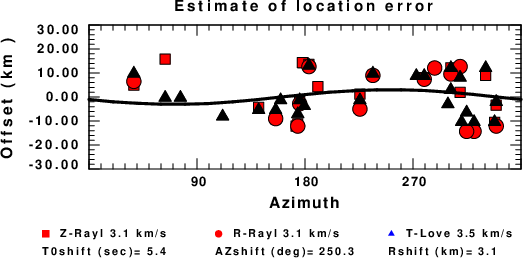
The derived shift in origin time and epicentral coordinates are given at the bottom of the figure.
Velocity Model
The CUS.model used for the waveform synthetic seismograms and for the surface wave eigenfunctions and dispersion is as follows
(The format is in the model96 format of Computer Programs in Seismology).
MODEL.01
CUS Model with Q from simple gamma values
ISOTROPIC
KGS
FLAT EARTH
1-D
CONSTANT VELOCITY
LINE08
LINE09
LINE10
LINE11
H(KM) VP(KM/S) VS(KM/S) RHO(GM/CC) QP QS ETAP ETAS FREFP FREFS
1.0000 5.0000 2.8900 2.5000 0.172E-02 0.387E-02 0.00 0.00 1.00 1.00
9.0000 6.1000 3.5200 2.7300 0.160E-02 0.363E-02 0.00 0.00 1.00 1.00
10.0000 6.4000 3.7000 2.8200 0.149E-02 0.336E-02 0.00 0.00 1.00 1.00
20.0000 6.7000 3.8700 2.9020 0.000E-04 0.000E-04 0.00 0.00 1.00 1.00
0.0000 8.1500 4.7000 3.3640 0.194E-02 0.431E-02 0.00 0.00 1.00 1.00
Last Changed Sat Apr 27 04:38:13 PM CDT 2024





